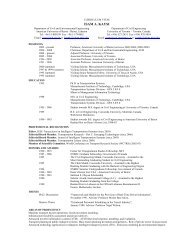40 Research and Travel Grants October <strong>2007</strong>–September 20<strong>08</strong> M.A. Al‑Alaoui Novel Approach to Fractional Poles and Zeros with Applications to PID Control, URB Grant, AUB, amount: $4,325, October 1, <strong>2007</strong>-September 30, 20<strong>08</strong>. Short-term Faculty Development, URB Grant, present a paper at the International Conference on Interactive Computer Aided Learning, Villach, Austria, September 20<strong>08</strong>. Short-term Faculty Development, URB Grant, present a paper at the 14th International Conference on Electronics, Circuits, and Systems, Marrakeh, Morocco, December <strong>2007</strong>. H.A. Artail Forming a Distributed Database from Standalone Mobile Database in Mobile ad hoc Networks, URB Grant, AUB, amount: $5600, October 1, <strong>2007</strong>-September 30, 20<strong>08</strong>. Interoperability Framework for a Mobile ad hoc Network formed by Heterogeneous Devices, Lebanese National Council for Scientific Research, amount: $4,667, October 1, <strong>2007</strong>-September 30, 20<strong>08</strong>. Long-term Faculty Development, URB Grant, Conduct research on Vehicular Networking Systems, Research Laboratory, <strong>University</strong> <strong>of</strong> Michigan, Dearborn, August 10, <strong>2007</strong> – September 11, <strong>2007</strong>. L. Bazzi Limited Independence Versus Weight Probability, URB Grant, AUB, amount: $6,100, October 1, <strong>2007</strong>-September 30, 20<strong>08</strong>. Short-term Faculty Development, URB Grant, present a paper at the 48th <strong>Annual</strong> IEEE Symposium on Foundations <strong>of</strong> Computer Science (FOCS <strong>2007</strong>), October <strong>2007</strong>. R. Chedid Modeling and Assessment <strong>of</strong> Electromagnetic Fields from High-Voltage Power Lines, URB Grant, AUB, amount: $4,825, October 1, <strong>2007</strong>-September 30, 20<strong>08</strong> (with Pr<strong>of</strong>. Farid Chaaban). Optimal Engineering Design for Dependable Water and Power Generation in Remote Areas Using Renewable Energies and Intelligent Automation (OPEN-GAIN), <strong>University</strong> <strong>of</strong> Mannheim/Commission <strong>of</strong> European Communities, amount: € 160,885, January 1, <strong>2007</strong>-December 31, 2009 (with Pr<strong>of</strong>s. S. Karaki and K.Y. Kabalan). A. Chehab Testing Nanometer-Technology CMOS in the Presence <strong>of</strong> Leakage and Process Variations, URB Grant, AUB, amount: $8,425, October 1, <strong>2007</strong>-September 30, 20<strong>08</strong> (with Pr<strong>of</strong>. A. Kayssi). IEEE Foundation. Problem Solving Web Forum, IEEE Foundation, amount: $20,000, March 20<strong>08</strong> - March 2009. (with Pr<strong>of</strong>s. Imad Elhajj and Ayman Kayssi). Short-term Faculty Development, URB Grant, present a paper at the International Design and Test Workshop (IDT), December 16-18, <strong>2007</strong>, Cairo, Egypt. Z. Dawy Infrastructure Controlled Peer-to-Peer Networks: Design Challenges and Performance Gains, URB Grant, AUB, amount: $6,100, October 1, <strong>2007</strong>-September 30, 20<strong>08</strong>. FPGA-Based Accelerator for Haplotype Interface with Applications to Lebanese Genomic Data Sets, Lebanese National Council for Scientific Research, amount: $4,200, December 1, 2006 – December 31, 20<strong>08</strong> (joint work with Pr<strong>of</strong>. Mazen Saghir and Pr<strong>of</strong>. Rami Mahfouz). A. El‑Hajj Modified Bowtie Antenna for Wi-Fi and WiMAX Applications, URB Grant, AUB, amount: $4,325, October 1, <strong>2007</strong>-September 30, 20<strong>08</strong>. Short-term faculty development grant, Present a paper at the 5th International Conference on Electrical and Electronics Engineering (ELECO <strong>2007</strong>), December <strong>2007</strong>, Bursa, Turkey. I. Elhajj Design and Implementation <strong>of</strong> an Autonomous Multi- Sensory Intervention Device, URB Grant, AUB, amount: $6,600, October 1, <strong>2007</strong>-September 30, 20<strong>08</strong>. A Prototype for Increasing the Accuracy <strong>of</strong> Stomach Calibration in Sleeve Gastrectomy Surge, Lebanese National Council for Scientific Research, amount: $6,333, December 31, <strong>2007</strong> – December 31, 20<strong>08</strong>. IEEE/A Website for Literature Review Dissemination, IEEE Robotics and Automation Society, amount: $2,900, August 1, <strong>2007</strong> - November 30, <strong>2007</strong>. Short-term Faculty Development, URB Grant, present a paper at the <strong>2007</strong> IEEE/ASME International Conference on Advanced Intelligent Mechatronics, Zurich, Switzerland, September, <strong>2007</strong>. K. Kabalan Using Genetic Algorithms and Simulated Annealing in the Pattern Synthesis <strong>of</strong> Antenna Arrays Leading to Controllable Decaying Sidelobes and Adjustable Beamwidth, URB Grant, AUB, amount: $5,325, October 1, <strong>2007</strong>-September 30, 20<strong>08</strong>. Short-term faculty development grant, Present a paper at the 5th International Conference on Electrical and Electronics Engineering (ELECO <strong>2007</strong>), December <strong>2007</strong>, Bursa, Turkey. S. Karaki Electromagnetic Field Calculation using the Boundary Segment Multipole Method, URB Grant, AUB, amount: $4,325, October 1, <strong>2007</strong>-September 30, 20<strong>08</strong>. F. Karameh I nformation Theoretic Modeling <strong>of</strong> Information Flow in Cortical Neuronal Systems: Information Content in Brain Electric Field Potentials, URB Grant, AUB, amount: $10,000, October 1, <strong>2007</strong>-September 30, 20<strong>08</strong>. Short-term Faculty Development, URB Grant, present a paper at the <strong>2007</strong> <strong>Annual</strong> Meeting <strong>of</strong> Micro Science, San Diego, USA, November <strong>2007</strong>. A. Kayssi Development <strong>of</strong> a Service Science Management and Engineering (SSME) Track in ECE Graduate Program, IBM Middle East FZ, amount: $15,000, December 20, 2006-until completion <strong>of</strong> work (with Pr<strong>of</strong>s. Ali El-Hajj and F. Mrad). Short-term Faculty Development, URB Grant, present a paper at the DTIS Conference, Rabat, Morocco, September <strong>2007</strong>. 4. research Policy-Driven Security Protocol, Lebanese National Council for Scientific Research, Amount: $ 8,667, December 2006 - December <strong>2007</strong>, (with Pr<strong>of</strong>s. Ali Chehab and Ramzi Haraty). M. Mansour Raptor Codes: Hardware-Oriented Code Construction and Decoder Design, URB Grant, AUB, amount: $6,600, October 1, <strong>2007</strong>-September 30, 20<strong>08</strong>. F. Mrad Short-term Faculty Development, URB Grant, present a paper at the International S<strong>of</strong>tware and Data Technologies, Barcelona, Spain, July <strong>2007</strong>. Short-term Faculty Development, URB Grant, present a paper at the International Seminar for Advanced Control Applications, Madrid, Spain, November <strong>2007</strong>. Control Engineering for Economic Planning, Lebanese National Council for Scientific Research, amount: $5,333, December 31, <strong>2007</strong> – May 31, 20<strong>08</strong>. Technology Literacy for Transparency and Accountability (TLTA), USAID-Mideast, amount: $50,000, November <strong>2007</strong>- June 20<strong>08</strong> (with Pr<strong>of</strong>s. A. Kayssi, I. Elhajj, A. Chehab, M. Saghir, Z. Dawy, S. Karaki, and H. Artail. M. Saghir Characterizing Datapath Components <strong>of</strong> Configurable S<strong>of</strong>t Processors, URB Grant, AUB, amount: $6,100, October 1, <strong>2007</strong>-September 30, 20<strong>08</strong>. FPGA-Based Accelerator for Haplotype Interface with Applications to Lebanese Genomic Data Sets, Lebanese National Council for Scientific Research, amount: 6,333, December 1, 2006 – December 31, 20<strong>08</strong>. RFU-Enhanced Synergetic Processor Units for the Cell Architecture, IBM Middle East FZ, amount: $10,000, December 20, 2006-until completion <strong>of</strong> work. Short-term Faculty Development, URB Grant, present a paper at the International IEEE/ACM Conference on Compilers, Architectures, and Synthesis <strong>of</strong> Embedded Systems (CASES <strong>2007</strong>), Salzburg, Austria, September <strong>2007</strong>. 41
42 Visit <strong>of</strong> Dr. Raad Raad Dr. Raad Raad graduated from the <strong>University</strong> <strong>of</strong> Wollongong, Australia in 1997 with a Bachelor <strong>of</strong> Engineering (Hon 1) in 1997. He went on to complete his PhD thesis entitled “Neuro-Fuzzy Logic Admission Control in Cellular Mobile Networks” in 2006. Dr. Raad has over five years <strong>of</strong> industrial research experience and another five years <strong>of</strong> experience in academic research. Dr. Raad is the author <strong>of</strong> five United States patent filings <strong>of</strong> which three have been granted and over fifty refereed publications and technical reports. His expertise is in wireless communications with a focus on Medium Access Control (MAC) and bandwidth management protocols for wireless networks. Dr. Raad has led and collaborated on significant projects in the areas <strong>of</strong> sensor networks, IEEE 802.11, IEEE 802.15.3, MeshLAN, RFIDs and cellular networks. The technical areas that he covered during the numerous projects include admission control, bandwidth management, low power MAC protocols and routing protocols. From 2001 to 2004, Dr. Raad worked for Motorola Research Labs in Sydney, Australia and reached the position <strong>of</strong> Staff Research Engineer. Since 2004, Dr. Raad has worked at the <strong>University</strong> <strong>of</strong> Wollongong, Australia. His initial appointment was as a Senior Research Fellow and more recently he has taken up a position as Senior Lecturer in the School <strong>of</strong> Electrical, Computer, and Telecommunications Engineering. From 2004 to 2006, his research focus was primarily on industrial projects and he worked on a large industrial research contract with Motorola in the United States to develop medium access control and QoS solutions for a multi-hop IEEE 802.15.3 Home networks. His current research focus is on RFIDs, Delay Tolerant Networking and Transport Control in wireless sensor networks. In early 20<strong>08</strong> Dr. Raad launched a joint venture called RaadTech Consulting (www.raadtech.com). RaadTech is an IT &T company that provides IPR capture tools, contract R&D, s<strong>of</strong>tware development and specialized training courses. Laboratories in the Electrical and Computer Engineering Department Introduction The Department <strong>of</strong> Electrical and Computer Engineering (ECE) is the largest department in the faculty <strong>of</strong> Engineering and Architecture (<strong>FEA</strong>). The Department <strong>of</strong>fers the degrees <strong>of</strong> Bachelor <strong>of</strong> Engineering in two majors: Electrical and Computer Engineering (ECE) and Computer and Communications Engineering (CCE); the Master <strong>of</strong> Engineering in Electrical and Computer Engineering (ME in CCE) with 4. research Developing the Middle East’s Future Technical Elite ECE Labs either the ECE Thesis option, ECE Non-Thesis option, or Information and Communications Technology (ICT) Thesis option; and the degree <strong>of</strong> Doctor <strong>of</strong> Philosophy (PhD) in Electrical and Computer Engineering. The Department has about 600 undergraduate students and 70 graduate students. The undergraduate ECE program is very flexible in terms <strong>of</strong> areas <strong>of</strong> specialization and elective courses, and the undergraduate CCE program continues to be the most popular program in engineering at AUB. Students accepted into either the ECE or the CCE undergraduate programs can complete their studies in eleven terms distributed over four calendar years, The courses taught in the Electrical and Computer Engineering field are reinforced by application <strong>of</strong> concepts learned in the ECE laboratories in different fields. Most <strong>of</strong> the existing ECE laboratories are in the CCC_SRB building, and in the Raymond Ghosn Building. The CCC_SRB building is temporary and will soon be replaced by the Irani Oxy Engineering Building. The new building will provide space to house all the <strong>FEA</strong> labs that exist now in SRB and other buildings, and additional new laboratories. Existing Laboratory Facilities Circuits and Analog Electronics Laboratory In the Electronics Laboratory, first and second year students carry out experiments in circuits and electronics featuring diode and transistor circuits, amplifiers, op-amps, wave generators, and digital electronics. Projects in third year courses and during the final year are also built and tested in this lab. Equipment includes oscilloscopes, digital multimeters, function generators, power supplies, and frequency 43







